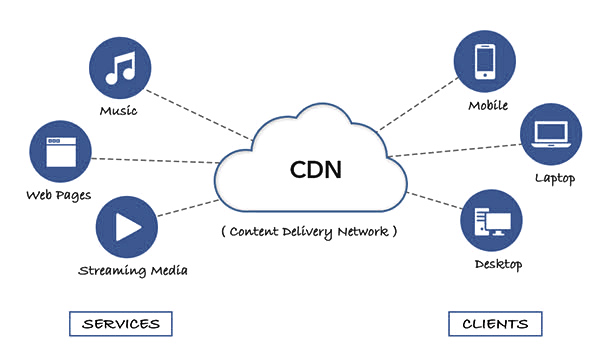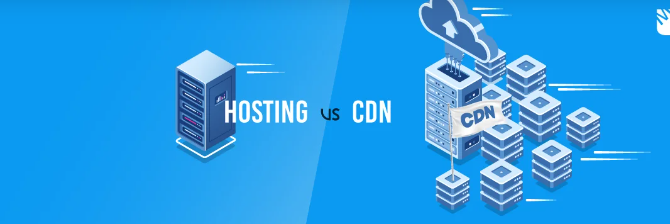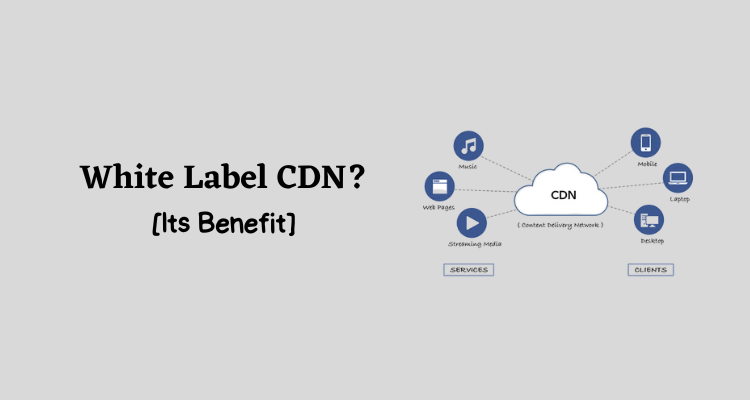How often did you observe your web page load time, depending on where you were located? Maybe never. However, the content loading time depends on the user’s geographic location.
For example, if your website is hosted on a US server, someone who is visiting it from Australia may notice a delay in the loading time is more than someone who’s visiting from the US.
Although this is a minor issue for a simple blog website, if you are running an International service or eCommerce business, that might be a problem.
Statistics show you get only 10 seconds to get the attraction of a new visitor. You must grab their attention within that period to turn them into customers.
To solve that problem and have business growth use of CDN has increased massively. Let’s understand how White Label CDN can solve the data loss issue and benefit your business.
What are CDN and White Label CDN
A Content Delivery Network (CDN) is a network of servers spread across different geographic locations to ensure users can access content with minimal latency.
This distributed system ensures that any user, regardless of their location, can quickly access content by connecting to the nearest server in the network.
A CDN can be used for many data types, including HTML pages, software downloads, and streaming media. It helps reduce bandwidth usage on origin servers and accelerates web page loading times for users by delivering cached versions of websites from multiple locations around the world.
Additionally, a CDN improves website performance by reducing average response time and significantly improving website speeds.
White Label CDN: This is the type of CDN where you can buy the infrastructure and service of a third-party service, but you will be the brand owner.
For example, you bought a CDN service from Amazon Web Service. You will have the same infrastructure in your CDN, which AWS sells to individual customers. However, you will be able to brand your CDN with your logo and name.
A public CDN from AWS will look like this: d111111abcdef8.cloudfront.net. But your White Label CDN can be something like: cdn.yourdomain.com.

How CDN Works
When your website is on single hosting and multiple user requests for the same content, it will deliver the nearest user first and others according to their location. PoP, or point of presence, plays a vital role in user content delivery. Understanding how a CDN works can help you determine whether it’s the right choice for your business.
CDNs use geographically dispersed proxy servers strategically placed in areas close to users. When someone visits a website, their requests are routed to the nearest server, which reduces latency and improves page load times.
The server will then deliver cached static content, such as images and videos, from its cache. At the same time, dynamic content, like user input, is sent directly to the origin server for processing. This setup ensures that all data is delivered reliably and securely across multiple networks.
In addition to reducing latency and improving page load times, CDNs provide added security measures like DDoS protection and encryption services.
CDN vs Hosting What are the Differences?

There is confusion between CDN and Standard hosting. Although both use similar technologies, they have different purposes.
On hosting, you can store your website data such as images, videos, or documents. You can use those files with your website builder to serve content to users accessing your site using the internet. However, in traditional hosting, your content is stored in only one server in a specific area of the world.
On the other hand, CDN is a collaborative network of servers spread worldwide. Each network saves a cached version of your pages and serves it to the closest users of that network. It delivers the content faster, reduces data loss, and protects your hosting from request overload.
When a CDN cannot deliver your files from a neighboring server, they will automatically switch to providing the file from the next closest server.
How White Label CDNs can Benefit Your Business
You won’t need a CDN for all websites/services. But imagine you are running a large-scale eCommerce business or a nationwide service business that sells in all states in the US. Users accessing your site from nearby will have a better experience than those geographically farthest from your server.
It occurs for various reasons, like the speed of your server and the network of users. White-label CDN is the solution if you want to provide an evenly satisfying experience for your potential customers.
1) Reduce Hosting Cost
Instead of getting strong web hosting with a high cost to deliver worldwide, getting CDNs strategically around your targeted location is a better option. You can get a public CDN at a very low price around the world that will sum up to a lesser amount than a high-speed server.
Also, you can go with a decent hosting plan if you want White Label CDNs to handle the site speed. You can reduce the hosting cost by using the proper strategy for hosting and CDNs.
2) Improve User Experience
According to statistics, 79% of users won’t return to a website if it loads slowly. 40% of the users leave the page if it takes more than 3 seconds to load. 47% of online shoppers demand a website should load in less than 2 seconds.
A study shows that 92% of website visitors are mobile users. Mobile takes a lot more time than desktop to load a page. So, if you cannot provide a faster experience for mobile users, you are already losing a lot of business.
Research shows that a business can increase by 2% conversion rate if it can decrease 1 second loading time. On the contrary, if your website loads 1 second slower than the competition, you will lose 7% conversion.
All these metrics show how important user experience is for any business. Aside from page load speed, users also dislike a site when image/videos buffers while loading. To solve these problems and provide a smooth experience, a good quality CDN service provider is the only option.
3) Real-Time Response
If you have an instant chat feature or your website needs to update, real-time CDNs can help. Especially for Stock market sites and Sports Booking sites, CDNs are significant assets. Also, you can use CDNs to send push notifications to your customers to try your new products.
Especially if you are launching an occasional unique product for a short period, CDN push notifications can be a game-changer marketing strategy.
4) Keeping Your Website Live
Everyone has experienced a data center crash at least once. Suppose you rely only on your hosting server. That can cause a lot of problems for users. CDN can save your website from those problems for many users.
As CDN will cache everything on your website in CDN servers, users can access your cached site while the primary server is getting fixed.
5) Reduce Data Loss and Latency
When a user requests data, it transmits them in small packets through the internet. These packets contain a small amount of data about the source, address, rules, protocol, identifier, errors, etc.
While moving to distant networks, there is a high chance of getting lost in some data. Those data can arrive late, which will cause latency or arrive in a desynchronized way. The end user will get a bad experience if this occurs.
For example, you might have experienced it while live streaming. Data latency and data loss can cause desynced audio and visual or total loss of an event.
Using CDNs, you can fix all these problems automatically, as CDN will serve the content from the nearest server. It will result in smooth data transmission from host to users.
6) Audience Monitoring Based on User Analytics
Half of the internet is based on CDN nowadays. So CDNs are much more than just making your website faster. You can check the analytics and decide on your marketing plans. You can collect data such as the user’s device, location, and connectivity.
You can monitor where the most traffic is coming from and get a CDN on that area to serve better. Also, if you plan to run an advertisement campaign for your product/service, you can also use that insight.
7) CDN Provides Some SEO Benefits
It is no secret now that Google prefers faster websites. A faster website also means better user interaction which leads to better ranking.
On top of that, CDN reduces overload on your primary server, so there is less worrying about hosting bandwidth. CDN also helps you pass technical SEO tests such as Google Page Speed Insight.
CDN automatically manages your duplicate copy by canonical tags, which would take a lot of time and effort to do manually.
8) Better Security From Cyber Attacks
You might have good website security from your hosting service or Platform, such as WordPress, Shopify, etc. However, hackers can start DDoS attacks on your website to take your server down.
Hackers send simultaneous bots on your website to exhaust the hosting space. Once your bandwidth is nil, they will bypass the system to take control of your website. In 2018, 54% of small businesses complained about DDoS attacks on their site.
CDN can help you prevent hosting exhaust by sending the traffic to other servers. Your central server will always remain invisible no matter where they attack.
Who Should Use White Label CDN
Although every website should use CDN, at least for security purposes, some businesses must do that.
Some typical businesses which must use CDNs:
Who Doesn’t Need A CDN
A CDN is not mandatory if your website is a simple blog or local service website. For a plumber in Canberra, Australia, a traditional hosting server in that city is enough for that business.
Conclusion
White Label CDN offers many advantages to businesses, from increased speed and improved user experience to cost savings. It is an excellent solution for any company seeking to improve website performance without investing predominantly in hardware or software.
We hope you got some ideas about this technology and how it can help your business. There is much more to explore about White Label CDN, yet we hope this article will help you.
